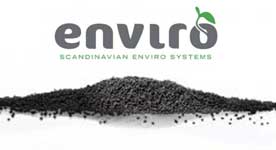The ISCC certification obtained recently for Scandinavian tyre recycler Enviro’s recovered pyrolysis oil has made it more attractive to various fuel producers as a raw material, it adds. The reason is that this certification, combined with the EU mass balance approach, which forms part of the EU Renewable Energy Directive, means that the oil can be commercialised by fuel producers as 100% renewable.
“Our oil can thus strongly improve the producers’ ability to meet the reduction demands that are based on taxation in relation to the proportion of fossil raw material,” says Thomas Sörensson, CEO of Enviro.
In September this year, the pyrolysis oil that Enviro recovers at its plant in Åsensbruk was awarded sustainability certification in accordance with the International Sustainability & Carbon Certification (ISCC), as communicated by the company earlier. Enviro’s pyrolysis oil is recovered from end-of-life tyres and has a highly renewable, so-called biogenic content, since tyres largely comprise natural rubber. The content varies, but on average, tyres from vehicles such as cars, trucks and buses, have up to 50% biogenic content. Large tyres from construction machinery and mining machinery may have a content of as much as over 70%.
The mass balance system is included in the EU Renewable Energy Directive and fulfillment of mass balance entails that, overall, there is a balance between ingoing and outgoing sustainable materials. Mass balance is also central to the ISCC certifications, ISCC EU and ISCC Plus, which Enviro received earlier this year, and aims to ensure that the registration of amounts and properties of incoming raw materials (end-of-life tyres) is placed in relation to the amounts and properties of the products (oil, gas, steel and carbon black) that result from the recycling process. As a result of the ISCC EU certification, it is possible for Enviro, via the mass balance approach, to maximise the renewable content to the volume of oil sold to fuel producers. Since pyrolysis oil usually has a biogenic content of 50 percent, this entails that approximately half of Enviro’s recovered oil can be commercialized by fuel producers as 100 percent renewable.
The certification obtained in September has also expanded the area of use for the oil and, accordingly, to greater interest from potential customers and negotiations with more partners than previously.
“As more people see the commercial opportunities of our oil, the number of requests for potential deliveries increases, as does the number of negotiations. Following certification, we are in an excellent position and feel that it is more important for us to choose the right counterparties and terms for long-term agreements, rather than moving rapidly,” says Thomas Sörensson.

